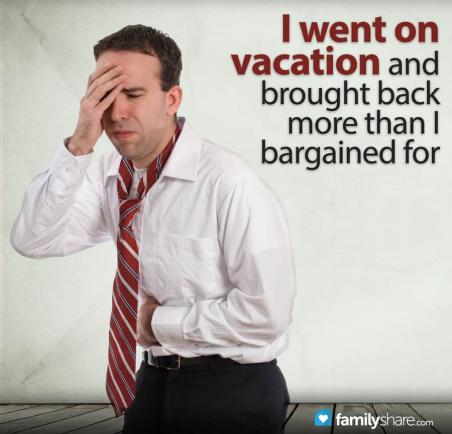
Having traveled internationally more times than I can count to almost every corner of the world, I can relate to fears - both reasonable and unreasonable - about catching something. Let me share some of what I've learned after 30 years of living and traveling abroad.
Here are some specific tips to help you avoid diseases:
Visit the health department
Before you leave on your vacation, visit the local office of your state health department. They can give you all of the shots you need for your trip. This can be pricy, but it is also the most important thing you can do to protect your family from serious illness abroad.
Choose a safer destination
If you are still in the process of choosing a destination, give some thought to visiting countries with fewer health problems. The US Center for Disease control and prevention offers up-to-date information on 200 travel destinations on their website.
Be cautious with fruits and vegetables
If you are traveling in the developing world, be aware of the risks of eating raw food. Contaminated lettuce doesn't look any different than safe lettuce. If you don't clean it yourself, don't eat it. Even in upscale restaurants, you can't be assured that the fresh produce has been cleaned to your standards.
Avoid street vendors
Though some caution against buying anything from street vendors, most that are cooking hot, fresh food are generally safe. Avoid vendors who sell things that could spoil if not kept properly chilled or those who sell raw fruits and vegetables. Bananas and other fruits you peel yourself are likely safe, but don't buy a pineapple from a street vendor who will carve it up beautifully for you. You don't know how sanitary his knife is and neither does he.
Don't drink the water
In most of the developing world, local residents don't drink the tap water - at least not without boiling it. Don't even brush your teeth or rinse the toothbrush with tap water. Most hotels provide free bottles of water in your room.
Wash hands regularly
The most likely illness hazard in most of the world is food borne diseases, but the people you encounter on the plane, in the airport and other public areas - including the folks from your home town - are being pressed into contact with you in ways that you don't normally experience. The best way to protect yourself from getting sick from this contact is to wash your hands regularly. Carry some hand sanitizer and pass it around before you eat any meal - including meals on the plane.
In 30 years of travel and more trips than I can count, I have only become seriously ill on one trip. I picked up salmonella in Mexico City a few years ago. While that was the sickest I've ever been, once I was diagnosed and treated with antibiotics, the symptoms cleared up in about 24 hours. For healthy adults, salmonella is not much of a threat. For those with compromised health, the young or the elderly, however, the disease is potentially fatal. Just because you love hot and spicy food prepared at your favorite restaurant at home, doesn't mean you're ready to eat whatever is presented to you in an exotic city. Don't let your trip become a tour of bathrooms and hospital rooms. Take reasonable precautions and you can likely go and return with stories of only the great things you hoped to see!

